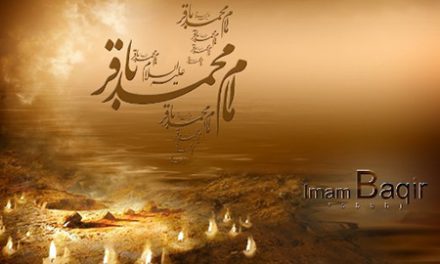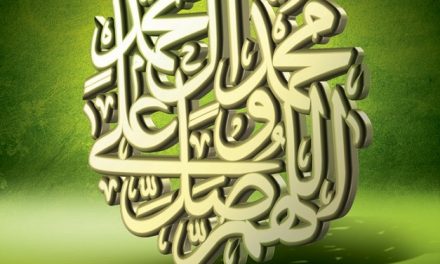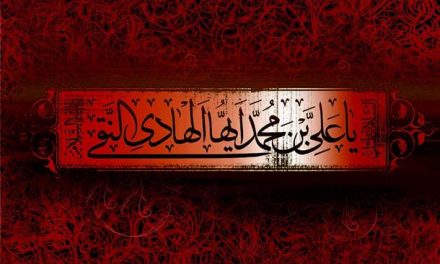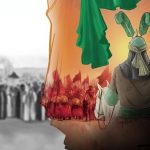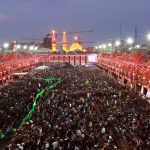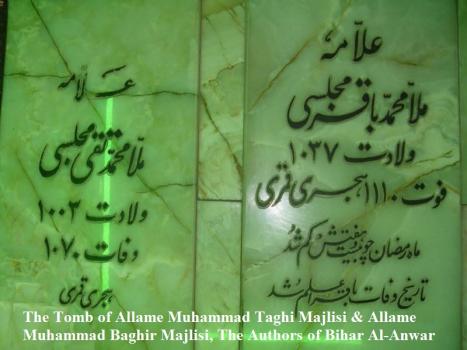
As an encyclopedia of the legacy of the Ahl al-Bayt, Bihar al-anwar has always had a great and important position in the scientific tradition of Shia.
Aqa Buzurg Tihrani says, “Bihar al-anwar is a comprehensive book which contains the narrations of the Ahl al-Bayt; accurate researches, better than which cannot be found and it must be said that similar to this book has neither been written in the past, nor would ever be written in the future.”
Imam Khomeini wrote, “Bihar al-anwar is the work of the great scholar of hadith, Muhammad Baqir al-Majlisi which contains nearly 400 books and treatises; Bihar al-anwar is itself a library and its author wrote it when he saw that many hadiths books are about to be lost and wasted due to their small size and being less accessed.”
The important point about writing of Bihar al-anwar is that the author’s limited usage of the Four Books made it a less important jurisprudential reference and even though it has a great coverage of other fields in Shi’a culture, it is not used in jurisprudential discussions as a common reference.
Also, the type of analyses al-Allama al-Majlisi gives about hadiths have been made in moderate Akhbari atmosphere and even where he faces rational issues, he criticizes that with a theological approach based on the apparent meaning, not with a rational and philosophical approach; therefore, some Shi’a scholars believe that al-Allama al-Majlisi’s explanations and comments are not accurate enough.
Thus, some commentaries and comments al-Allama al-Majlisi gives under some titles such as soul, self, intellect, etc. have been criticized by scholars; for example, in his gloss about some parts of Bihar al-anwar, Allama Tabataba’i wrote, “… and the safe approach for someone who is not competent enough in deep rational discussions is that he follows the apparent meaning of the Quran and hadiths and leave understanding the truth of them to God and avoids entering deep rational discussions either approving or disapproving anything.” Also in Ayan al-Shia, al-Sayyid Muhsin al-Amin wrote, “Many of the statements, explanations and comments of al-Allama al-Majlisi for hadiths, etc. have been written in hurry and this has led to less beneficial and more erroneous discussions.
Sources
At the beginning of the book, al-Allama al-Majlisi mentioned 387 Shi’a books written by 25 authors as the sources. He has also benefited from Sunni sources for proving and approving Shi’a hadiths the number of which reaches 85. In writing Bihar al-anwar, he has also benefited from lexical sources and commentaries as well. Al-Allama al-Majlisi also mentions some sources during the writing process of the book.
Titles
Below, the titles of the books of Bihar al-anwar based on the lithograph print (25 volume set) and the contemporary print (110 volume set) are listed:
(volumes 1 & 2) Kitab al-‘aql wa l-jahl about the virtue of knowledge, scholars and their ranks, authenticity of reports and disapproving induction with a comprehensive introduction about the sources of the book and useful information, in 40 chapters.
(Volumes 3 & 4) Kitab al-tawhid wa l-sifat wa l-asma’ al-husna, containing the book of unity of God, His attributes and good names of His Holy Essence, Tawhid al-Mufaddal, and Risala Ihlilaja, containing 31 chapters.
(volumes 5 to 8) Kitab al-‘adl wa l-mashiyya wa l-irada wa l-qada’ wa l-qadar, containing the books of justice of God, Divine providence, ordinance, fore-ordainment, guidance, deviation, trial, nature, covenant, repentance, reasons of rulings, preludes to death and its endings, in 59 chapters.
(Volumes 9 & 10) Kitab al-ihtijajat wa l-munazirat, containing the arguments and debates in 83 chapters.
(Volumes 11 to 14) Kitab fi ahwal al-anbiya’ wa qisasihim, about the biographies of prophets (PBUT) and their stories in 82 chapters.
(Volumes 15 to 22) Kitab fi ahwal nabiyyina al-akram (PBUH) wa ahwal jumlat min aba’ih, containing the biography of the Holy Prophet (s) and some of his forefathers, explaining the truth of miracles and the miracle of the Qur’an, biographies of Abu Dharr, Salman, ‘Ammar, Miqdad and some other great companions, in 72 chapters.
(Volumes 23 to 27) Kitab fi mushtarakat ahwal al-a’imma, about the common states of Imams, requirements of Imamate, their Wilaya, unusual attributes and their superiority over the previous prophets (PBUT), rewards for loving them, merits of their posterity and some debates of scholars, in 150 chapters.
(Volumes 28 to 34) Kitab fi l-fitan ba’d al-Nabi (PBUH), about the mischiefs made after the Prophet (PBUH), conduct of caliphs and what happened during their rules, Battle of Jamal, Battle of Siffin, Battle of Nahrawan, Mu’awiya’s plundering of Iraq, biographies of some of Imam Ali’s (AS) companions, commentary on some of poems attributed to him and the commentary of some of Imam’s letters, in 62 chapters.
(Volumes 35 to 42) Kitab fi ahwal Amir al-Mu’minin (AS) min wiladatih ila shahdatih about the biography of Imam Ali (AS) from his birthday to his martyrdom, biography of Abu Talib, the father of Ali (AS), his faith, and the faith of some of the companions of Imam Ali (AS) and hadiths about Imamate of Imams, in 128 chapters.
(Volumes 43 to 45) Kitab fi ahwal Sayyidat al-Nisa’ wa l-Imamayn al-humamayn al-Hasan al-Mujtaba (AS) wa Abu Abd Allah al-Husayn (a)”, about the biographies of Lady Fatima (SA), Imam al-Hasan (AS) and Imam al-Husayn (AS), uprising of Mukhtar al-Thaqafi and seeking revenge for the martyrs of Karbala, in 50 chapters.
(Volumes 46 to 48) Kitab fi ahwal al-a’immat al-arba’a ba’d al-Husayn (AS) about the biographies of the four Imams after Imam al-Husayn (AS) i.e. Imam al-Sajjad (AS), Imam al-Baqir (AS), Imam al-Sadiq (AS), Imam al-Kazim (AS) and some of their companions and children, in 46 chapters.
Source: al-shia.org

